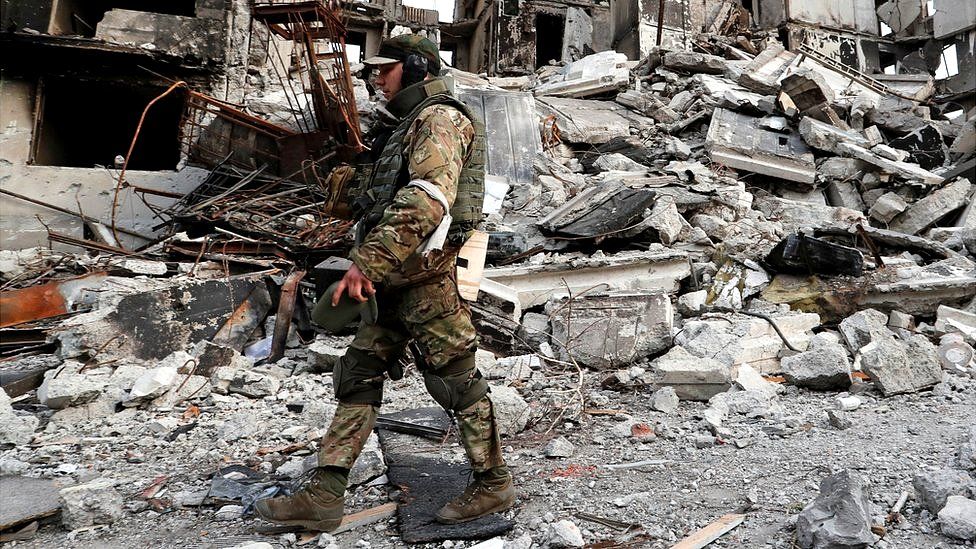Manas Dasgupta
NEW DELHI, April 16: Two weeks of relative calm was shattered on Saturday again with Russia stepping up its air strikes on Ukraine as its warplanes bombed Lviv and its missiles struck its capital city of Kyiv ad threatened to launch more long range attacks on Ukrainian cities to avenge the sinking of its naval guided-cruiser, the flagship of its Black Sea Fleet.
Russia also placed on its “black list” the British Prime Minister Boris Johnson and several top U.K. Cabinet ministers and politicians banning their entry into Russia for their “unprecedented hostile actions of imposing sanction on the country over the Ukraine conflict, the Russian Foreign Minister said in a statement on Saturday.
The full list of 13 British politicians on the so-called “stop list” issued from Moscow included Indian-origin ministers — UK Chancellor Rishi Sunak, Home Secretary Priti Patel and Attorney General Suella Braverman — as well as Deputy Prime Minister Dominic Raab, Foreign Secretary Liz Truss and defence secretary Ben Wallace. The Russian Foreign Ministry said the list will be expanded in the “near future” to include more British politicians and parliamentarians.
Russia’s defence ministry said they had used “high-precision long-range” weapons to hit facilities at an armaments plant in Kyiv and destroyed the production buildings of an armoured vehicle plant in the Ukrainian capital. Kyiv mayor Vitali Klitschko said authorities were still determining whether anyone had been killed or injured in the attack.
Ukraine’s military said Russian warplanes that took off from Belarus had also fired missiles at the Lviv region near the Polish border, where four cruise missiles were shot down by Ukrainian air defences. Russia said it also struck a military vehicle repair factory in Mykolaiv, a city close to the southern front.
A heavy police and military presence was deployed around the factory, the day after a similar strike on a plant that produced the Neptune missiles Kyiv and Washington say sunk Russia’s Black Sea naval flagship on Thursday.
Saturday’s strike on the Ukrainian capital was among the first since invading Russian forces began withdrawing from regions around Kyiv last month, instead turning their focus on gaining control of the eastern Donbas region. Kyiv regional governor Oleksandr Pavliuk said there were at least two other Russian strikes on the city Friday and that civilians thinking about returning should “wait for quieter times.” Residential areas of Kyiv were struck repeatedly at the beginning of Russia’s invasion of Ukraine from late February. Moscow has denied intentionally striking civilian infrastructure.
The strike on the arms factory on the outskirts of Kyiv, which produced the missiles used for sinking the Russian warship, came a day after Ukraine claimed it had destroyed Russia’s Moskva warship, which Moscow later said had sunk. According to a statement on Ukraine’s state weapons manufacturer Ukroboronprom website, the Vizar factory produced Neptune missiles.
Andrei Sizov, a 47-year-old owner of a nearby wood workshop, said the strikes came at night. “Around 1:30 am, my security guard called me because there was an air strike,” he said. “There were five hits. My employee was in the office and got thrown off his feet by the blast.” The governor of Ukraine’s southern Odessa region, Maxim Marchenko, had said Thursday that the Ukrainian army had used Neptune missiles to strike the Moskva.
A Pentagon official said the sinking of the Moskva, which had been leading Russia’s naval effort in the seven-week conflict, was a “big blow” for Moscow, while the fate of its crew of more than 500 was uncertain. The official said survivors were observed being recovered by other Russian vessels, but Ukrainian authorities said bad weather had made rescue operations impossible. “It’s a big blow symbolically,” the Pentagon official said. “There is a pride aspect.”
Russia also warned the United States of “unpredictable consequences” if the West continued its “irresponsible militarization of Ukraine” even as several countries said they had stopped delivery of armaments to Ukraine.
Ukrainian President Volodymyr Zelensky said between 2,500 to 3,000 Ukrainian troops have died so far in the war and another 10,000 have been injured. More than five million people have now fled Ukraine since the Russian invasion on February 24, the United Nations says.
Ukraine is working with NATO member Turkey as much as possible for more support over Russia’s invasion and understands – even though it is not happy with – the reality of Ankara’s parallel ties to Moscow, a Ukrainian diplomat said.

